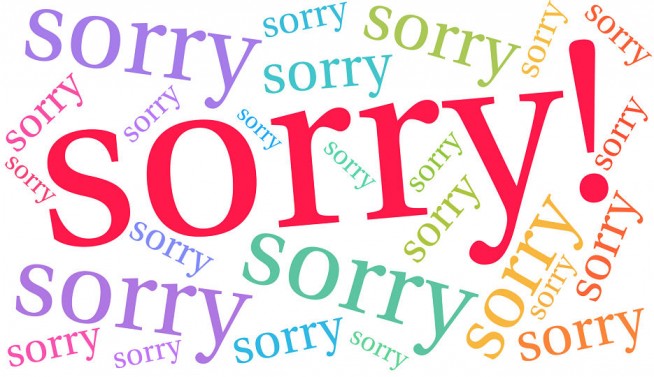“Stop saying sorry”, he said. “It’s fine. And you should consider apologizing less.”
I hardly know this man, except for our conversations in the coffee shop.
My face flashed hot. My heart jumped awkwardly to my throat, and then back down.
His comment kind of pissed me off.
Actually, no. It did piss me off.
‘Kind of’ is just another qualifier we use to minimize “bad” emotions.
So I’ll just come out and say it. This pissed me off.
“He hardly even knows me. Can he not see I already have this figured out?”
I over explained. “I used to work in customer service and so that’s why I’m extra polite because I don’t like it when other people are rude, and so I apologize more, and blah, blah, blah.”
I did this to ensure he could see my apology was necessary – while politely hiding my anger.
This is what we do. We politely hide our anger – because nice girls don’t get angry. But that’s another post.
When I walked out of the cafe, I began to observe what happened. Feeling upset, angry or annoyed is always a clear sign to look within.
When I did, I found he was right. It wasn’t necessary to apologize three times for changing my order once.
I just didn’t like him pointing out the fact that I’d fallen back into an old habit.
I’ve learned to monitor my sorries carefully, because being a people-pleasing prostrator brought me nothing but trouble and mental health issues.
Most women do this. It may not lead to anything huge. But it is guaranteed to keep you small.
When sorry routinely flies out of your mouth, you shrivel. Until one day? You’re barely even there.
Perhaps not literally. But then again, perhaps literally.
A friend joked the other day that her daughter turns up at our door to play and immediately starts apologizing. “Should I go home? Am I bothering you?”
“I did that to her,” she said.
We do this to ourselves. We do this to our kids.
We can’t help it unless we know better. And sometimes even when we do know better, we can’t help it.
We get caught in polarity. Our minds run wild. “If I stop saying sorry, I’m on a slippery slope from polite, kind and courteous to b*tch on wheels.”
Either/or. Slippery slope. Black and white. Mountain out of molehill.
But none of these need to be true.
We can take little steps to saying sorry less and empowering ourselves more – with no danger of approaching b*tch on wheels.
Here’s an example:
This morning I went to the local print shop – owned by some parents from school. I spoke to Jon. I didn’t speak to Alix. She was with another client.
I emailed her with my print order. It began, “Sorry I missed you earlier….”
“What am I writing that for?”, I thought. “She was with a client. I had to get to a client. Is there really anything to be sorry about here?”
I deleted the whole sentence. It felt good.
It seems inconsequential. Insignificant. Imagined. Semantics.
But then again.
We have to start with the little things to get strong enough for the big things. @SoniaVoldseth (Click to Tweet!)
Because the journey to NOT saying “I’m sorry” is twice as hard as learning TO say it.
Why?
- Women get more messaging than men about prostrating ourselves at the feet of everyone else.
- Women get more messaging than men about not offending anyone.
- Women get more messaging than men about serving and stuffing down anger and just letting things go.
This translates to saying “sorry” even when there’s nothing to be sorry for.
I’m not blaming men. Men suffer from this too. Just not as much.
I’m not blaming women. No one is to blame.
But we do have the power to fix it.
We have so much more power than we imagined.
- We have the power to stop saying sorry when it’s not necessary.
- We have the power to stop prostrating, to stop incessantly pleasing people, and to stop getting smaller.
- We have the power to know that if we do offend someone it does not need to become our problem.
- We have the power to get angry and to be angry and to learn to be okay with that. If we can’t be okay with it, that anger WILL manifest itself into something much more insidious.
- We have the power to get stronger and be stronger – little by little, day by day.
When we apologize LESS for things that really don’t matter, we become more.
More loving, more accepting, more nurturing.
It seems like a paradox, but it’s not.
We know discernment. We know appropriate apology.
We are intelligent beings holding deep within us the seed of something great and powerful.
But we only find it when we stop covering it up with sorry.
 Sonia Voldseth is a holistic life coach who tries her best to show up as a real person. She learned the hard way that loving people does not mean pleasing them all. Now she helps women (and men) find strength through vulnerability. Sign up for her free newsletter on finding happiness within. You can also find her on FB or Twitter.
Sonia Voldseth is a holistic life coach who tries her best to show up as a real person. She learned the hard way that loving people does not mean pleasing them all. Now she helps women (and men) find strength through vulnerability. Sign up for her free newsletter on finding happiness within. You can also find her on FB or Twitter.












